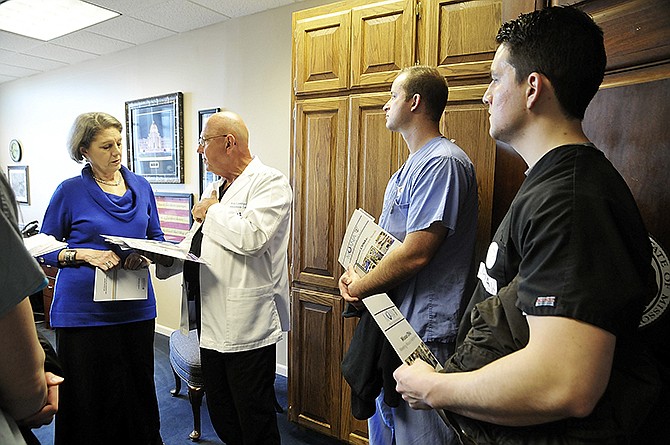Certified registered nurse anesthetists (CRNAs) lobbied Wednesday at the state Capitol against bills that would continue prohibiting their ability to administer certain forms of medication for pain management.
The bills, both in the Missouri House and Senate, eliminate the sunset clause on the 2012 legislation, and CRNAs argue prohibiting their ability to administer pain management medication will hurt rural Missourians. The Missouri Society of Anesthesiologist (MSA) argues the bill is to ensure safe and best practices for patient care.
"In rural areas, there are no anesthesiologists, so we are the only ones available to provide these procedures," said Cassandra Decker, president of the Missouri Association of Nurse Anesthetists. "Imagine you are patient in pain - you have terrible back pain and you don't even want to walk across the room, let alone get in a car and drive an hour or two for a pain specialist in Kansas City or St. Louis when you can drive across your town and get these services from a CRNA."
CRNAs were first able to administer these forms of pain management treatments in 1998, Decker said. She added the reason the bill in 2012 had a sunset clause was to give the CRNAs a chance to create an advanced fellowship and better training to do these procedures. The training has been created, Decker said.
"CRNAs are trained very highly using the same medications and the same drugs with the same procedures to get the same outcomes," said Ron Lenninger, a CRNA from Capital Region Medical Center in Jefferson City.
The CRNAs at the Capitol were handing out information on rural Missourians' access to anesthesiologists as well as the information on studies by the Cochrane Collaboration and the Lewin Group, which Lenninger mentioned.
"All I am trying to do is keep the status quo as it is," said Rep. Elijah Haahr, R-Greene, the sponsor of the House bill. "At the point where there is such a good program where we believe CRNAs can capably perform these procedures then they can come back to the Legislature and ask us to exempt them back out from under that statute."
Haahr added CRNAs serve a valuable purpose, but the procedures in question require a lot of skill to successfully administer.
Matt Satterly, anesthesiologist and physician of the day at the Capitol, said: "Certainly we are concerned about access to health care, but I think certain interventional injections, pain injections are best kept in the hands of a trained physician in order to provide the greatest level of safety and care for the patient."

